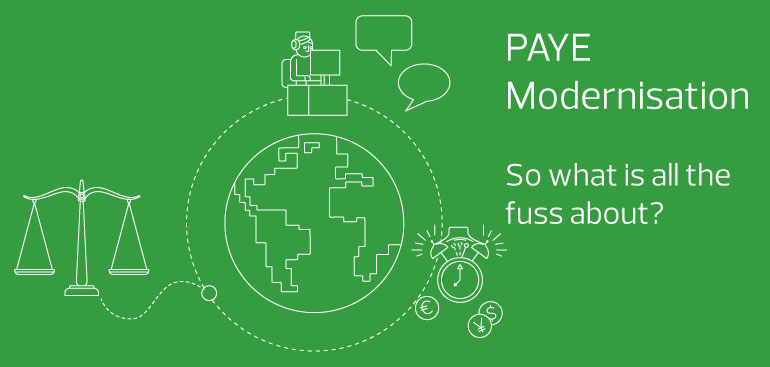PAYE Modernisation and Real Time Reporting (RTR) has been effective since 01 January 2019 and applies to all registered employers with employees.
From 01 January 2019 employers are required to report all employee remuneration, together with the corresponding PAYE, USC and PRSI, to Revenue on or before the date their employee’s remuneration is paid, on a real time basis.
The PAYE Modernisation project has introduced the biggest changes to the application of payroll taxes in Ireland since the PAYE system came into effect in 1960. The principal goal behind its introduction is an expected saving to the exchequer, from increased compliance levels, of circa €50 million annually. Revenue hope that the introduction of RTR will increase compliance under the PAYE system and improve its ability to penalise non-compliant taxpayers without initiating a formal audit.
What are the key changes that have been introduced?
- Employers are required to report full details of payments made to employees, together with the corresponding PAYE, USC and PRSI, on or before the date of the payment to their employees. This is to be done through Revenue’s Online Service (ROS) and eliminates the need for employers to complete the monthly P30 return and the year end P35 Report. However, the payment date of the payroll taxes remains the same i.e. 14th of the month following the month of payment.
- Revenue Payroll Notification (RPN); This replaces the current employer copy of the employee tax credit certificate i.e. the old P2C.
- At the end of each month the employer will receive a statement from Revenue summarising the information reported. This report will be available on ROS from the 5th day of the following month. It is the employers responsibility to review this statement for any errors or discrepancies and inform Revenue of such differences before the 14th day of the month. If the statement is not disputed before the 14th day of the month, the statement will become the employers statutory monthly payroll tax return.
- Employers who fail to deduct PAYE when required must account for the PAYE subsequently by treating the payment made to employees as being net of tax i.e. a gross will be required and payroll taxes applied accordingly on the grossed up amount.
- PAYE Modernisation and RTR have removed the requirement for employers to prepare and submit an annual P35 Report for the tax year 2019 onwards. Additionally, Employers are no longer required to provide a Form P60 after the end of a tax year or a P45 on the cessation of an employment from 2019 onwards. Please note that these three forms are required for the 2018 tax year.
- Employers are now required to send details of any new employees on commencement of employment. Employers must now inform Revenue of the date of cessation of an employment on or before the date on which the employment ceases.
What PAYE Modernisation issues should Employers think about ?
- Employers must exercise greater control over employee expenses for travel and subsistence or risk exposure to unpaid payroll taxes, interest and penalties.
- The taxation of Benefits In Kind (non-cash remuneration) is proving difficult for employers as the “actual” value of the monthly benefit is not always readily available, with particular regard to cars and business mileage, where the value of the benefit to be taxed is dependent on the amount of kilometres travelled over the course of a tax year. A review by employers of their tracking systems for BIK’s should be undertaken as these are now taxed on a real time basis.
- With the introduction of RTR, Revenue are in a much better position to impose interest for late payment of payroll taxes. It is hoped that Revenue will show some restraint in this regard as the new system is in its infancy. However, the increased possibility of interest penalties reinforces the need for businesses to act quickly to get up to speed with RTR such that costly interest penalties are not incurred.
If you as an employer have not yet converted your payroll to comply with the new rules or require any assistance following implementation, please feel contact Philip Colohan ([email protected]) or Yvonne Brady ([email protected]) at RSM Ireland.

